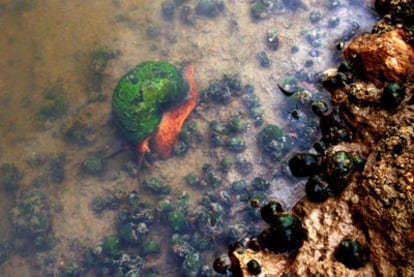What green apple from China goes after rice?
But these mollusks are no joke, having survived all attempts to eradicate the species from the Ebro Delta
Not even drying out half of the Ebro River Delta, in Tarragona province, or dumping quicklime into irrigation channels has managed to remove their little shells from the rice paddies. The apple snail has continued to give farmers headaches for the third year in a row since it first appeared in northern Spain, and now the plague threatens to reach the south.
It is a highly resistant species that reproduces very quickly, and it has been spreading slowly but surely throughout the area since 2009, affecting 9,500 hectares of land. And this, despite the
3.5 million eurosthe Catalan regional government has spent since last year to eradicate the species by taking unprecedented measures: leaving the hardest-hit 9,500 hectares on the left side of the delta without water for nine months, and filling the irrigation ditches with quicklime.
"No country has managed to eradicate this plague," says Ravindra Joshi, an Indian biologist who has been studying the apple snail and its effects on crops since 1980. "After the species is detected, it takes about four years before crop damage occurs," he says. Next year, he predicts, the delta will start to feel the full effects of the animal. "By then, it's usually a catastrophe," says Joshi.
"I just don't know what we're going to do about this critter," says Hernán Subirats, the expert the Catalan government put in charge of the plan to eradicate the species. "At least it looks like there aren't any more of them than there were last year. If we hadn't done anything, there wouldn't be a single rice plant left," he says.
Nevertheless, hundreds of thousands of snails have survived all attempts to get rid of them. This season, the experts have applied a chemical with saponin: a toxic substance with effects similar to soap which helicopters and tractors dump onto the fields. This treatment, which costs around
¤160 per hectare, has only been around 60 percent effective.
But it has proven to be totally ineffective against the millions of lilac-colored eggs that are inundating the canals and the sides of the delta. "An apple snail can lay anywhere between 400 and 500 eggs every 10 days. In eight months, these offspring are fertile: if you do the math, it just about makes you sick," says Subirats.
There is no industrial way of eradicating them: all you can do is dive in and destroy them by hand. "We've tried using an oil that suffocates them. But the clutches of eggs are covered in a jelly-like substance, and they make holes in the oil and breathe right through them," says Subirats.
In December 2010, six million snails were counted in the Ebro Delta, according to data from the Catalan regional government. Around 450 plots of rice paddies are still affected by the plague, 140 of them very seriously; that is, more than 50 snails per square meter. Two snails can eat through 400 rice roots in a single night, the equivalent of an entire plot.
"It's no small feat: so far, the rest of the country and the continent have been saved. But they can't be eradicated in the delta anymore," says Joshi, who adds that the apple snail causes tens of billions of euros in damages each year around the world. "I'm surprised that the Spanish government and the European Union aren't paying more attention to the plague."
The Catalan regional government has assigned 77 people to stop the snail from spreading to the right side of the delta at all costs. But this invasive mollusk can even crawl its way upstream. Subirats says that it is the worst invasion ever seen in an area that has already been threatened by other foreign species. Even so, he is confident they will be able to find a solution for the clutches and reduce the apple snail population by the end of the year. "If they do, Spain would be the first country in the world capable of making headway in eradicating this plague," says Joshi.

Tu suscripción se está usando en otro dispositivo
¿Quieres añadir otro usuario a tu suscripción?
Si continúas leyendo en este dispositivo, no se podrá leer en el otro.
FlechaTu suscripción se está usando en otro dispositivo y solo puedes acceder a EL PAÍS desde un dispositivo a la vez.
Si quieres compartir tu cuenta, cambia tu suscripción a la modalidad Premium, así podrás añadir otro usuario. Cada uno accederá con su propia cuenta de email, lo que os permitirá personalizar vuestra experiencia en EL PAÍS.
¿Tienes una suscripción de empresa? Accede aquí para contratar más cuentas.
En el caso de no saber quién está usando tu cuenta, te recomendamos cambiar tu contraseña aquí.
Si decides continuar compartiendo tu cuenta, este mensaje se mostrará en tu dispositivo y en el de la otra persona que está usando tu cuenta de forma indefinida, afectando a tu experiencia de lectura. Puedes consultar aquí los términos y condiciones de la suscripción digital.








































